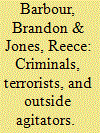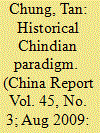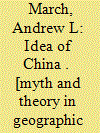| Srl | Item |
| 1 |
ID:
118145


|
|
|
| 2 |
ID:
121436


|
|
|
|
|
| Publication |
2013.
|
| Summary/Abstract |
This article is a critical geopolitical analysis of Chinese media representations of the 5 July 2009 riots in Xinjiang, China. Significant events often define the geopolitical climate by creating a space for the construction of boundaries between identity categories and the appropriate norms for behaviour towards the Other. The post-riot reports framed the event through the prism of the global war on terror to justify a violent response to protect Chinese citizens from the perceived threat of the Other. After connecting theories of narratives, the event, and group making, the article identifies three representational tropes - the criminal, the terrorist, and the outside agitator - in Chinese documents that create boundaries between the identity categories Uyghur and Han and define how the Other should be treated. The three representation tropes of the Other in the aftermath of the 5 July riots simultaneously situate the protestors as outside Chinese society and perpetuate the claim of the superiority of Chinese culture and civilisation.
|
|
|
|
|
|
|
|
|
|
|
|
|
|
|
|
| 3 |
ID:
099809


|
|
|
|
|
| Publication |
2009.
|
| Summary/Abstract |
The article is an exploration of an alternative geo-civilisational paradigm in an effort to escape the dissatisfaction with the prevalent geopolitical model. In the new 'geo-civilisational paradigm', the world should cherish the ideal of universal harmony as represented by 'shijie datong' (grand harmony in the world) aspired to by Chinese civilisation and 'vasudhaiva kutumbakan' (world as one family) aspired to by Indian civilisation. Such a paradigm can be established because we already have the example of it in the cultural interaction between Chinese and Indian civilisations in the past. Civilisational overlapping can create 'metonymic thesis' that serves to strengthen the vitality of civilisation and this only happens during the overlapping of mutually respectful and friendly civilisations. The uniqueness of the 'historical Chindian paradigm' is twofold, as the advent of Indian civilisation into China was by invitation and it also meant to accomplish serious business of an unprecedented inter-cultural joint venture, that is, the Sanskrit-Chinese translation enterprise. Second, the Sino-Indian cultural interaction gave a facelift to China which has uniquely survived for two millennia as the world's sustainable civilisational state.
|
|
|
|
|
|
|
|
|
|
|
|
|
|
|
|
| 4 |
ID:
030834


|
|
|
|
|
| Publication |
West Vancauver, Douglas David & Charles Limited,
|
| Description |
167p.hbk
|
| Standard Number |
071536507X
|
|
|
|
|
|
|
|
|
|
|
|
Copies: C:1/I:0,R:0,Q:0
Circulation
| Accession# | Call# | Current Location | Status | Policy | Location |
| 014350 | 951/MAR 014350 | Main | On Shelf | General | |
|
|
|
|